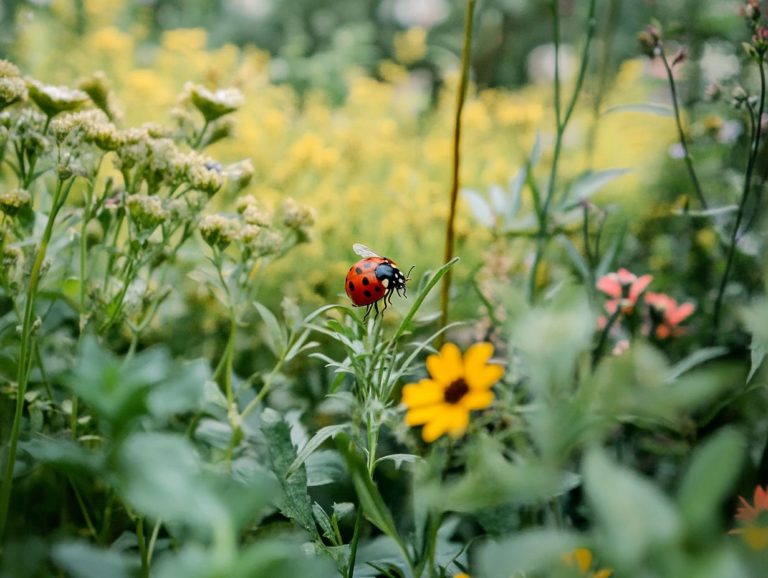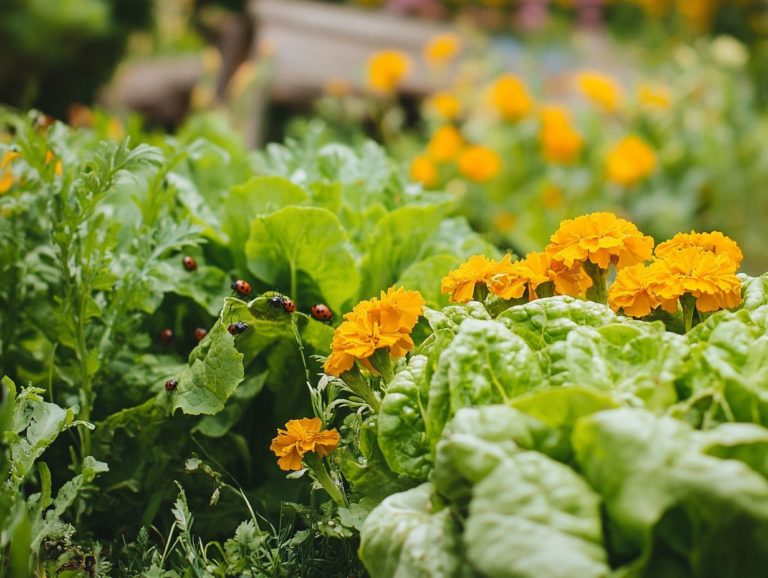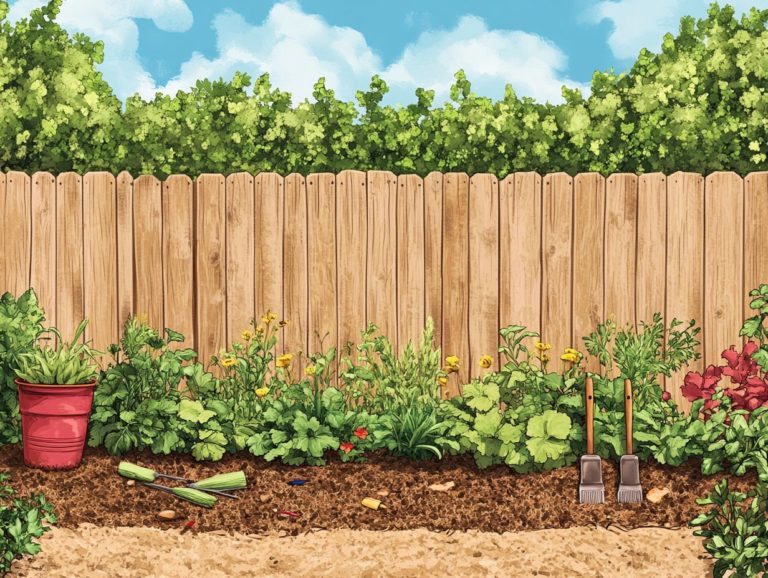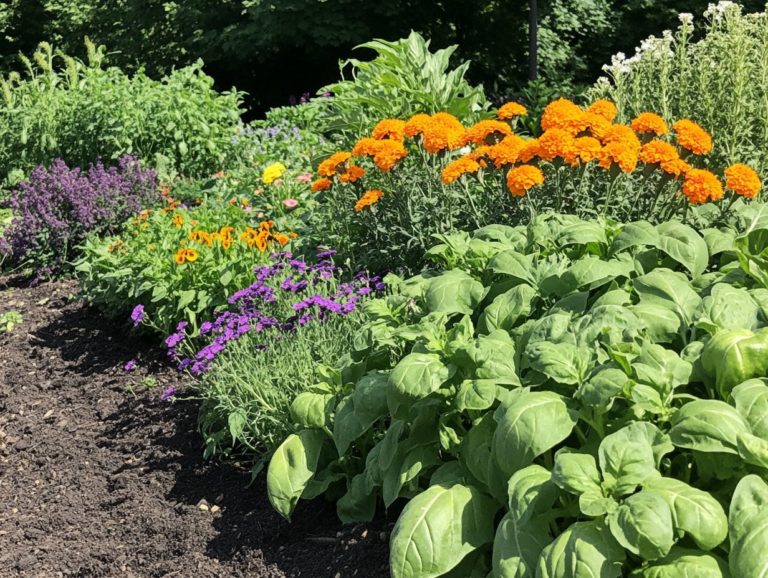5 Tips for Maintaining a Pest-Free Vegetable Garden
Creating a thriving vegetable garden is rewarding, but pests can quickly turn your hard work into frustration. Here are five essential tips to maintain a healthy, pest-free garden. From choosing the right location to using natural pest control methods, this guide has everything you need.
You’ll also learn how crop rotation and attracting beneficial insects can enhance your garden’s resilience. Ready to cultivate your flourishing space? Let s dive in!
Contents
- Key Takeaways:
- 1. Choose the Right Location for Your Garden
- 2. Keep Your Garden Clean and Tidy
- 3. Use Natural Pest Control Methods
- 4. Rotate Your Crops
- 5. Attract Beneficial Insects
- What Types of Pests Can Affect Your Vegetable Garden?
- Frequently Asked Questions
- What are the benefits of having a pest-free vegetable garden?
- What are the top 5 tips for maintaining a pest-free vegetable garden?
- Why is crop rotation important for maintaining a pest-free vegetable garden?
- Can I use pesticides in my vegetable garden to control pests?
- What should I do if I notice pests in my vegetable garden?
- How often should I inspect my vegetable garden for pests?
Key Takeaways:
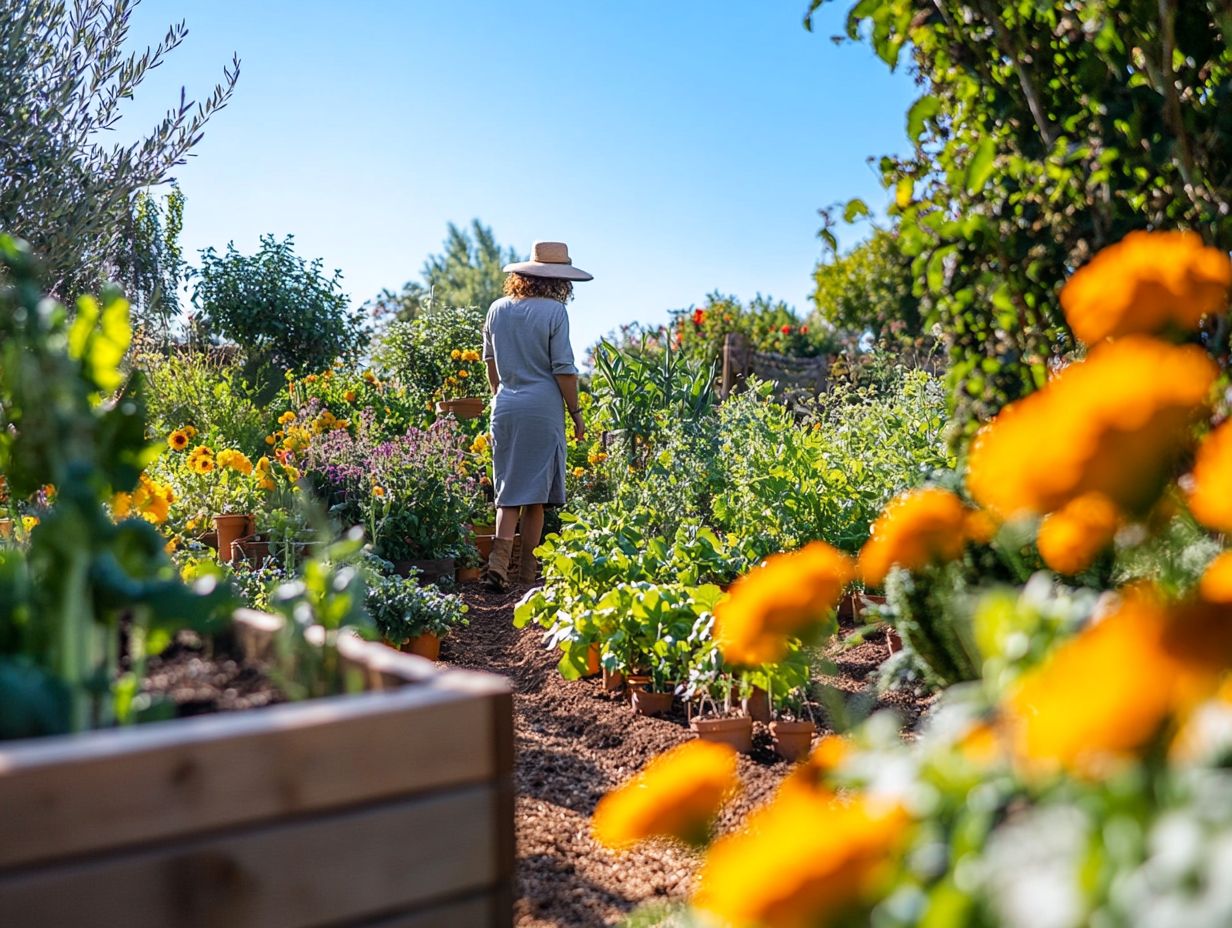
- Choose a suitable location for your vegetable garden to prevent pest infestation.
- Maintain a clean and tidy garden to eliminate potential hiding spots for pests.
- Implement natural pest control methods, such as using companion plants and organic sprays.
1. Choose the Right Location for Your Garden
Choosing the right location for your garden is crucial for cultivating a thriving ecosystem. It directly impacts the health of your plants and overall growth conditions.
Look for a spot that gets plenty of sunlight. This light is essential for photosynthesis (the process plants use to turn sunlight into energy) and helps your plants grow strong. Also, consider water availability; being near a water source simplifies your irrigation efforts.
Don’t overlook air circulation; it influences humidity levels and reduces the risk of fungal diseases. Also, observe the surrounding wildlife, such as birds and beneficial insects. They help control harmful pest populations naturally.
By thoughtfully assessing these factors, you can create an environment that supports healthy plants and fosters a balanced ecosystem.
2. Keep Your Garden Clean and Tidy
Maintaining a clean and tidy garden is key to keeping pests and diseases at bay, and following 5 tips for managing pest resistance in plants can ensure your plants thrive throughout the growing season.
Regularly clear away debris like fallen leaves and twigs. This creates an environment that’s less inviting for unwanted insects and pathogens. To enhance your garden’s health, consider exploring 5 ways to encourage pollinators and control pests. Monitor for pests; catching issues early allows you to implement organic solutions before they escalate.
Consistently managing weeds boosts your garden’s visual appeal and ensures your plants access the nutrients and water they need efficiently. This simple maintenance boosts healthy growth and leads to a more vibrant garden!
3. Use Natural Pest Control Methods
Implementing natural pest control methods is an effective way to manage pests in your garden. For example, incorporating pest-resistant plants not only reduces reliance on chemical pesticides but also nurtures a balanced ecosystem that supports beneficial insects.
These methods include using organic insecticides sourced from nature, which are generally safer for the environment. By introducing beneficial insects, like ladybugs and frogs, you establish natural checks within your garden. For a more structured approach, consider implementing 5 tips for a successful pest monitoring plan that can help ensure these friendly predators effectively hunt down harmful pests, significantly reducing their numbers.
Additionally, using barriers like row covers can provide further protection against pests while allowing sunlight to reach your plants. Physical barriers effectively keep unwanted visitors at bay while still nourishing your plants. These natural solutions not only protect your plants but also enhance soil health and maintain biodiversity, cultivating a healthier garden environment.
4. Rotate Your Crops

Crop rotation is essential for managing pests and diseases. It also enhances soil health, improving yields of your vegetables, fruits, and herbs.
Alternating different crop types disrupts harmful pests’ life cycles. This leads to a notable reduction in their populations.
Incorporating legumes into your rotation enriches the soil with nitrogen, making it more fertile for the crops that follow. This practice mitigates pest damage and fosters a healthier ecosystem.
Rotate leafy greens with root vegetables or fruiting plants to optimize space and resources. Planting crops that attract beneficial insects strengthens your garden s natural defenses.
5. Attract Beneficial Insects
Want a thriving garden? Attract beneficial insects! These tiny heroes keep pests at bay while boosting your plants’ health.
Incorporate a diverse array of flowering plants, as many beneficial insects are drawn to nectar-rich blooms. When you plant daisies and marigolds, you re not just enhancing your garden s beauty; you re welcoming ladybugs, which help control aphid populations.
Creating habitats like small brush piles or shallow ponds provides inviting environments for toads and other helpful creatures. By reducing pesticide use, you can achieve effective pest management while nurturing these valuable allies.
What Types of Pests Can Affect Your Vegetable Garden?
Know the types of pests that invade your vegetable garden. This knowledge is vital for managing them and for discovering natural pest deterrents for your garden to keep your crops healthy.
Common invaders like aphids, potato beetles, and rodents compromise your vegetables’ vitality and can lead to significant yield losses.
Aphids cluster on tender new growth, sucking sap and causing leaves to curl. Potato beetles damage foliage, hindering photosynthesis. Rodents may gnaw at roots or seeds, disrupting germination.
By taking preventive measures, like using compost covers or barriers, you can better protect your crops from these threats.
Recognizing early symptoms of infestations, like discolored leaves or unusual holes, allows you to implement control measures swiftly. This approach safeguards your harvest and ensures a flourishing garden.
How Can You Identify and Control These Pests?
Identifying and managing pests in your garden demands vigilance and an understanding of various pest species. This knowledge empowers you to implement effective solutions, such as learning how to create a pest-free zone in your garden, ensuring your vegetable garden thrives.
Regular inspections are crucial for catching potential infestations early. Look for signs of damage, such as chewed leaves or unusual residue on your plants.
Utilizing traps can provide insights into the pests lurking in your garden. For example, sticky traps monitor flying pests, while bait traps target those closer to the ground.
Familiarize yourself with common pests and their distinctive traits, like the color and shape of aphids or the webbing from spider mites. Implementing natural pest control methods for your garden fosters a healthier ecosystem overall.
What Are Some Common Natural Pest Control Methods?

Common natural pest control methods you might consider include employing beneficial insects, organic insecticides, and methods to keep pests away that effectively deter pests while nurturing a healthy garden environment. These methods can supercharge your gardening!
By embracing these techniques, you can cultivate ecosystems that not only ward off harmful pests but also boost biodiversity. For instance, companion planting involves strategically pairing certain plants to naturally repel insects and enhance growth think marigolds alongside your tomatoes.
Introducing natural predators like ladybugs or lacewings can dramatically reduce aphid populations, providing a natural balance without resorting to chemicals. You can also set up water bowls for beneficial insects.
Homemade remedies, using ingredients like neem oil or garlic, present a safe alternative for treatment, showcasing the effectiveness of these sustainable practices in maintaining plant health. This thoughtful approach not only safeguards your garden but also contributes positively to the broader environment.
How Does Crop Rotation Help with Pest Management?
Crop rotation is essential for effective pest management, as it disrupts pest life cycles and minimizes soil-borne diseases, ultimately fostering healthier plants and more productive crops. By rotating your crops, you can also improve soil conditions and further support a resilient ecosystem.
By alternating various crops in the same area, you can break the survival patterns that pests depend on, making your garden more resilient. For example, following a nitrogen-fixing legume, such as peas or beans, with a heavy feeder like tomatoes not only maintains soil nutrients but also reduces the likelihood of pests that thrive on the same crop being planted repeatedly.
Another clever tactic is to intersperse crops like carrots with daikon radishes; the latter can help deter root fly infestations. These rotation strategies not only enhance soil fertility but also cultivate a balanced ecosystem key ingredients for your long-term gardening success.
Which Beneficial Insects Are Most Effective for Pest Control?
Certain beneficial insects, like ladybugs, frogs, and various predatory wasps, can be your garden’s best friends when it comes to pest control. These natural allies offer an effective solution for managing harmful pests while simultaneously enhancing the overall ecosystem.
Not only do these insects keep the populations of troublesome pests like aphids and caterpillars in check, but they also play a vital role in your garden’s health by pollinating flowers and breaking down organic matter.
To attract these helpful creatures, consider planting a diverse array of native flowers that bloom at different times, ensuring a steady food supply throughout the growing season. Steer clear of harmful pesticides that indiscriminately eliminate beneficial species along with the pests.
Instead, create inviting habitats such as small water sources or undisturbed areas rich with natural debris to encourage these allies to make your garden their home, transforming it into a vibrant and balanced ecosystem.
Frequently Asked Questions
What are the benefits of having a pest-free vegetable garden?
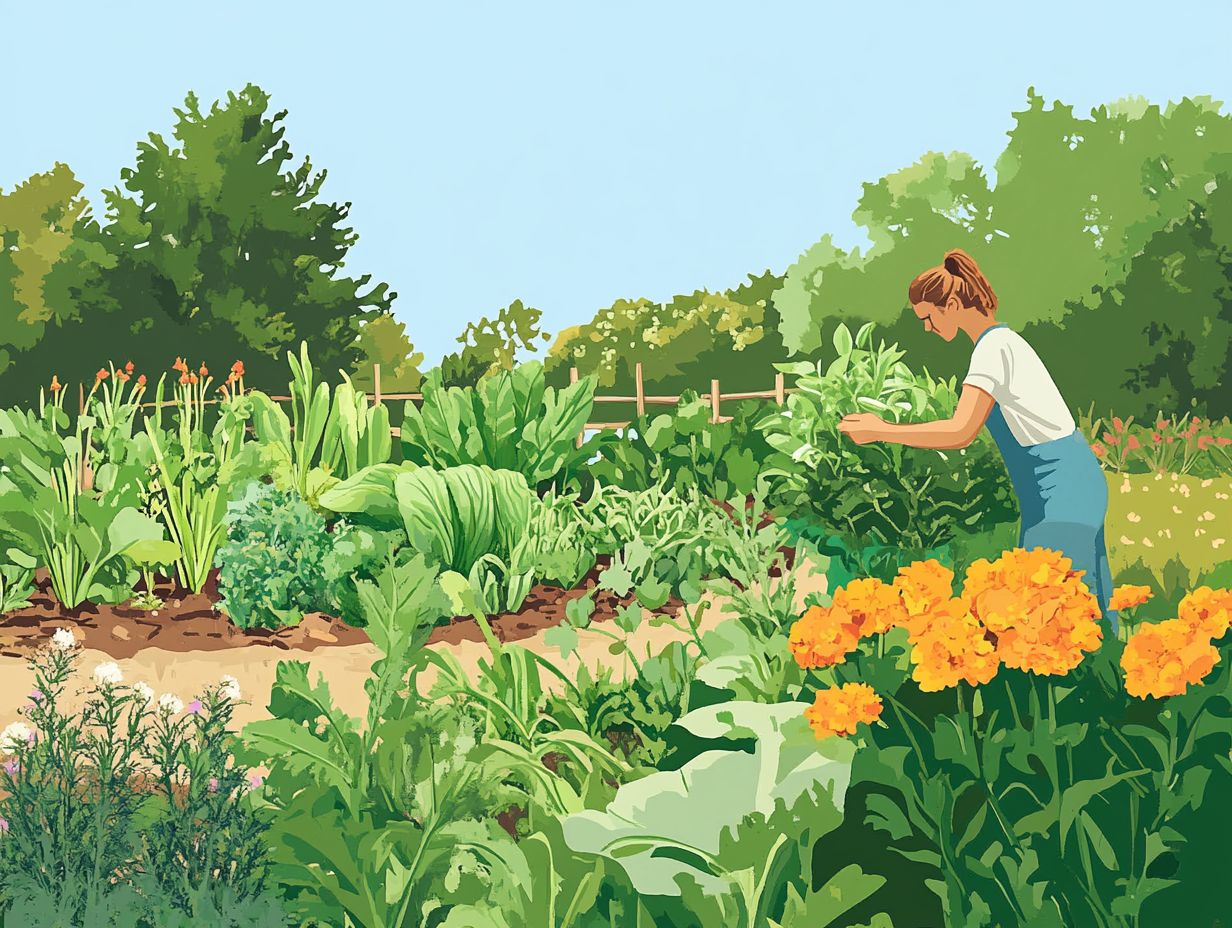
A pest-free vegetable garden can provide numerous benefits, including healthier plants, higher yields, and reduced use of pesticides. For effective strategies, consider these top 10 tips for organic pest management. It also promotes a healthier environment and can save you time and money in the long run.
What are the top 5 tips for maintaining a pest-free vegetable garden?
- Practice crop rotation to prevent pests from building up in the soil.
- Use natural pest control methods, such as introducing beneficial insects or using natural repellents.
- Keep your garden clean and tidy to reduce hiding places for pests.
- Choose pest-resistant varieties of vegetables.
- Use physical barriers, such as row covers, to protect your plants from pests.
Start your pest-free gardening adventure today!
Why is crop rotation important for maintaining a pest-free vegetable garden?
Crop rotation is key to keeping your vegetable garden free from pests.
Different plants attract different pests. By rotating them, you disrupt their life cycles and keep their numbers down.
Can I use pesticides in my vegetable garden to control pests?
While pesticides can control pests, they can also harm beneficial insects and pollinators. They may even contaminate your produce.
It’s best to use natural pest control methods and only consider pesticides as a last resort.
What should I do if I notice pests in my vegetable garden?
If you spot pests, take action quickly to avoid a bigger problem! First, identify the pest.
Then, you can use natural or organic methods to control them. This could include handpicking them off or using safe sprays made from plants.
If the infestation is severe, you may need to use pesticides. Be sure to follow the instructions carefully and use them sparingly.
How often should I inspect my vegetable garden for pests?
Make sure to check your garden at least once a week.
Regular inspections help you catch pest problems early and prevent them from becoming a major issue.
It’s also helpful to thoroughly check your plants before harvesting to ensure you’re not consuming any pests or their eggs.


